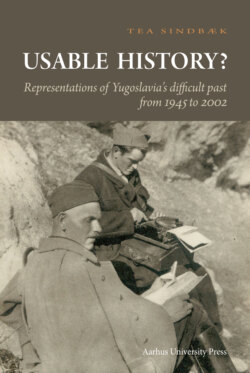Читать книгу Usable History? - Tia Sindbaek - Страница 9
На сайте Литреса книга снята с продажи.
The term and theme of genocide in Yugoslavia
ОглавлениеThe Serbo-Croatian equivalent of the word genocide, genocid, was not widely used in the first decades after the war. The word is not discussed in the common encyclopaedia of Yugoslavia, Enciklopedija Jugoslavije, published in the 1960s.30 Nevertheless, the Genocide Convention of the UN was included in the Yugoslav criminal code of 1951.31 In the Military Encyclopaedia, Vojna Enciklopedija of 1960, genocide is described as a crime under international law, of which the Fascist and particularly Nazi-German persecution of Slavic peoples, Jews and Roma during the Second World War is the main example. Yugoslavia and the Ustasha wartime practices are not mentioned.32 That the term was also available for political use is shown in a 1951 speech by Tito, accusing Molotov and the Soviet Union of genocide against the Crimean Tartars, Chechens and Volga Germans.33 It seems that for the first decades following the Second World War, the term of genocide was applied only to issues of international and foreign politics. In this period, it was hardly ever used to denote the wartime events in Yugoslavia.
One of the first historians to use genocide as a general term to describe nationally motivated persecution within Yugoslavia was the journalist and Partisan historian Vladimir Dedijer, in his chapters in Istorija Jugoslavije from 1972.34 Dedijer participated as a Yugoslav representative at the United Nations negotiations on the question of genocide in the late 1940s, and in the grassroots ‘Russel Tribunal’ of the late 1960s, at which the United States of America was convicted of genocide in Vietnam.35 Dedijer may indeed be one of the sources for the later widespread use of this word. During the 1970s and especially in the 1980s the term was used much more frequently among Yugoslav scholars and journalists, referring to past events as well as current events.
In her eminent study of the Serbian intelligentsia in the 1980s, Jasna Dragović-Soso points out the tendency on Serbia’s intellectual scene of rewriting Second World War history from the perspective of national victimisation and genocide. This is combined with widespread mention of genocide history within the Serbian press, sometimes suggesting that the Serbian nation in Yugoslavia continues to be endangered. Dragović-Soso identifies these currents as the ‘theme of genocide’.36
Other researchers have addressed the theme of genocide in the late 1980s and early 1990s. Bette Denitch and Robert Hayden particularly should be credited for showing how ‘genocide history’ influenced public and political discourse in this period.37 Yet none of these studies are concerned with the issue of how the massacres of the Second World War were dealt with in Yugoslav historiography before 1980. Wider studies of Yugoslav Second World War historiography touch the issue superficially, but the development of the theme of genocide over a longer period of time remains to be studied.38
In the present book, the theme of genocide will be understood broadly as referring to the waves of historical works and popular representations of history that point out genocide as an important element. In the second half of the 1980s, groups in Serbian historiography would claim that questions of genocide, particularly in relation to the wartime ‘Independent State of Croatia’ and the concentration camp at Jasenovac, were deliberately silenced, misrepresented or down-scaled, all for political reasons.39 Outside observers have suggested that the issue of the Ustasha’s persecution of Serbs was effectively buried, or that Titoist historiography attempted to exclude all ethnic aspects from official representations of the war.40 Approaches to the history of Yugoslavia’s wartime massacres were certainly constrained in the early post-war period. However, as this book shows, the internal Yugoslav massacres of the Second World War were neither ignored, nor silenced. Though they were not defined as genocide in the decades after the war, the events that were to become the central focus of genocide history in the 1980s were undeniably described in Yugoslav historical writing immediately after the war’s end. Wordings, perspectives and emphasis were different, but the internal Yugoslav massacres of the Second World War were certainly present in Yugoslav historical culture.
